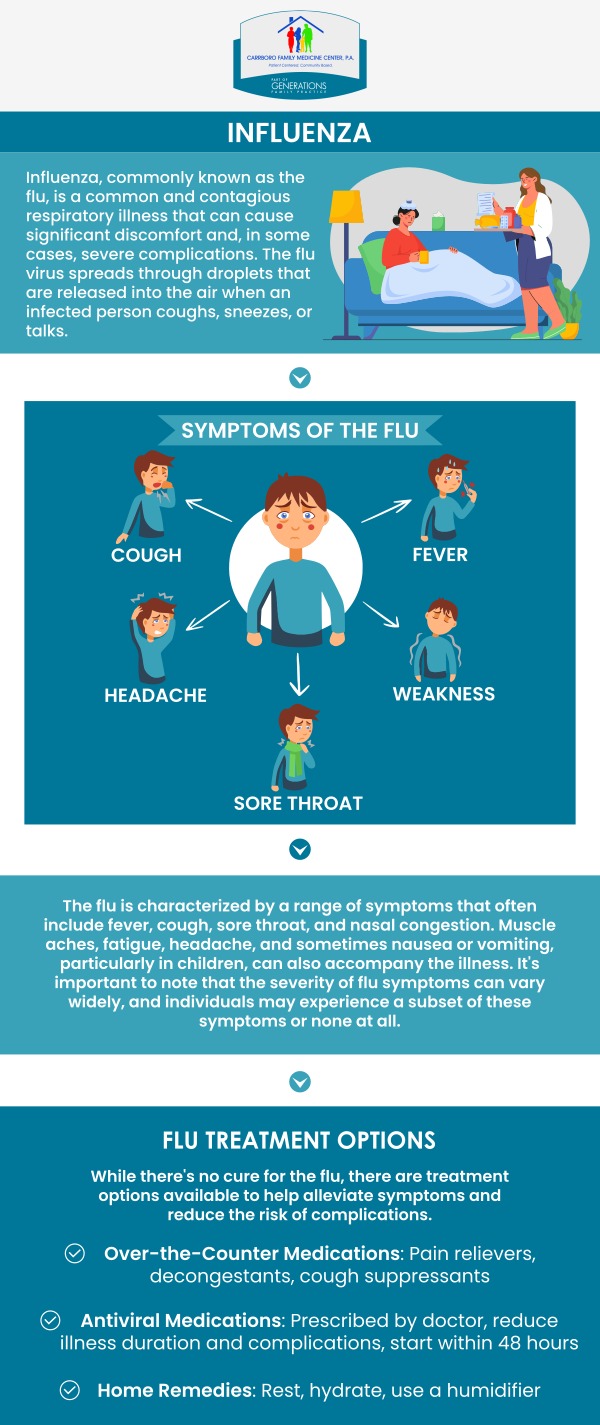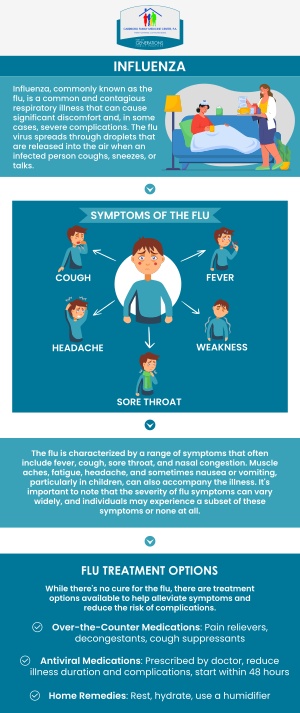Flu Symptoms in Children and When to Seek Care
At Carrboro Family Medicine Center, Dr. Yulia Neyman emphasizes recognizing flu symptoms in children early for timely care. Common signs include fever, fatigue, sore throat, cough, and body aches. Parents should seek medical attention if symptoms worsen, breathing becomes difficult, or the child appears unusually lethargic. Dr. Neyman provides compassionate pediatric care to help children recover safely and prevent flu-related complications. To consult our professionals, please contact us or book an appointment online. We are conveniently located at 610 Jones Ferry Rd Suite 102, Carrboro, NC 27510.


Table of Contents:
What are the most common flu symptoms in children?
How can I tell if my child’s fever is caused by the flu?
When should I take my child to the doctor for flu symptoms?
What signs indicate a serious flu infection in kids?
Spotting Influenza in Kids: Dr. Yulia Neyman’s Guidance from Carrboro Family Medicine Center
At Carrboro Family Medicine Center, we want our community to be well-informed about the most common flu symptoms in children. Flu symptoms often begin suddenly and can include a high fever—often one of the first signs. Children may also experience chills, body aches, headaches, a sore throat, and a dry cough. A runny or stuffy nose is common, and many children feel unusually tired or weak. Some children may develop stomach symptoms like nausea, vomiting, or diarrhea, which are less typical in adults.
We encourage parents and caregivers in the Carrboro area to watch for these symptoms, as the flu can sometimes lead to more serious complications, especially in younger children or those with existing health conditions. If your child has flu symptoms—particularly if they have trouble breathing, a persistent high fever, or signs of dehydration—please contact us promptly. Our team is here to provide guidance, answer your questions, and deliver the care your family needs during flu season.
Determining whether your child’s fever is caused by the flu can be challenging, as many illnesses can lead to a fever. We want to help you recognize the signs and know when to seek care. Influenza (the flu) often presents with certain symptoms that can help distinguish it from other causes of fever. Typically, the flu comes on suddenly and is characterized by a high fever, often above 101°F (38.3°C), along with chills, body aches, headache, fatigue, sore throat, and a dry cough. Children may also experience nausea, vomiting, or diarrhea—symptoms that are more common in younger kids.
Unlike the common cold, which usually develops gradually and may only cause mild fever and symptoms like a runny nose or mild cough, the flu tends to make children feel much more ill and exhausted. If your child’s fever is accompanied by a sudden onset of severe symptoms—especially during flu season or following exposure to someone with the flu—there’s an increased likelihood that influenza is the cause.
It’s important to remember that only a healthcare provider can definitively diagnose the flu. Our providers can perform a physical exam and, if needed, a rapid flu test to determine the cause of your child’s symptoms.
If your child’s fever is very high, lasts more than three days, or is accompanied by difficulty breathing, persistent vomiting, confusion, or signs of dehydration, please contact us right away. These could be signs of a more serious illness or complications from the flu. Our team is here to support your family’s health—never hesitate to call us or schedule an appointment if you are concerned about your child’s symptoms or are unsure about the cause of their fever.
If your child has flu symptoms—such as fever, cough, sore throat, runny nose, body aches, or fatigue—it’s common to care for them at home with rest, fluids, and fever-reducing medication as recommended by your doctor. However, we want you to know when it’s important to seek medical care for your child.
You should bring your child if they have trouble breathing, are breathing much faster than usual, or if their lips or face appear bluish. Please also schedule a visit if your child is unusually sleepy, irritable, difficult to wake up, refuses to eat or drink, or shows signs of dehydration (such as a dry mouth, absence of tears when crying, or less frequent urination).
If your child’s fever is very high, lasts more than three days, or returns after initially improving, we recommend consulting one of our healthcare providers. Children with chronic health conditions—such as asthma, diabetes, heart disease, or weakened immune systems—are at higher risk for severe flu complications, and should be seen by a doctor at Carrboro Family Medicine Center if they develop flu symptoms. For infants younger than three months, any fever should prompt a call or visit to us right away.
We understand how concerning it can be when your child is sick with the flu. While many flu cases are mild, it’s important for parents and caregivers to recognize the warning signs that indicate a more serious infection requiring immediate medical attention.
If your child is experiencing difficulty breathing, rapid or labored breathing, or you notice their ribs pulling in with each breath, please contact Carrboro Family Medicine Center or seek medical care right away. Bluish or grayish color of the lips or face is also a sign that your child may not be getting enough oxygen and needs urgent evaluation.
A high fever that doesn’t respond to medication, or one that returns after initially improving, can signal complications such as a secondary infection. Likewise, persistent vomiting, inability to keep fluids down, or symptoms of dehydration—such as very little urination, a dry mouth, no tears when crying, or unusual tiredness—should prompt you to reach out to our office.
Neurological symptoms like extreme irritability, confusion, difficulty waking up, or unresponsiveness are serious and require immediate assessment. Seizures, though rare, are another red flag that requires urgent care.
If flu symptoms seem to improve and then return with a worse cough or higher fever, this could indicate a secondary bacterial infection like pneumonia. Infants are especially vulnerable; if your baby is not feeding well, is unusually fussy, or has trouble breathing, bring them as soon as possible.
Recognizing the key signs of influenza can help parents manage their child’s illness effectively, according to Dr. Yulia Neyman. The classic flu symptoms in children include an abrupt, high-grade fever (often 101°F or higher), an escalating cough, severe tiredness, and full-body muscle aches. For the majority of children, supportive home care with fever-reducers and plenty of fluids is sufficient. However, Dr. Neyman urges parents to seek medical care immediately for any infant younger than three months with a fever, or for an older child who shows worsening or persistent symptoms. Crucial warning signs like chest pain, the refusal to drink fluids, or new neurological symptoms (such as confusion or inability to interact) should prompt an immediate visit to Carrboro Family Medicine Center or an emergency facility. To consult our professionals, please contact us or book an appointment online. We are conveniently located at 610 Jones Ferry Rd Suite 102, Carrboro, NC 27510. We serve patients in Chapel Hill NC, Southern Village NC, Fearrington NC, Blands NC, and surrounding areas.
Check Out Our 5 Star Reviews



Additional Services You May Need
▸ Annual Physical Exam
▸ Primary Care
▸ Hypertension Management
▸ Chronic Diseases
▸ Diabetes Management
▸ Immunizations
▸ Lab Testing
▸ Sports Physicals
▸ STD Testing
▸ Allergy Treatment
▸ Acute Illness



